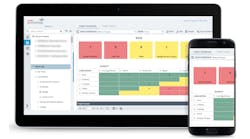Latest from Software
Sponsored
By Tony Nicolaidis, Chief Revenue Officer of Successware
Business management software can offer scalability for a plumbing business looking to streamline operations, reduce administrative work, digitize files, and more. Yet, the process of identifying the right business management software can be overwhelming considering all the solutions out there. Here are the top features to look out for in business management software and the reasons these innovations will help your business grow.
Analytics-Driven Reporting
The most important aspect to any growing business is the ability to collect, retain, and analyze your data. This should be one of the main functions of your business management software. Reporting on metrics allows you to determine what is working in your business and what is not.
Typically, an analytics-driven reporting dashboard will give you access to key performance indicators (KPIs) such as total revenue, gross margin, cost of goods sold, EBITDA, job history, and technician productivity. Reporting tools will allow you to combine that data into a high-level overview. You should also look for software that allows you to pull reports on all things within the software, such as Accounts Receivable and Payable, Commissions, Equipment, Inventory, Jobs, Marketing, Purchasing, and Agreements.
Even more valuable than the ability to access reports is the ability to customize them for your particular business. For example, a plumber will have different needs versus an HVAC technician, or a small business versus a larger company. Make sure your business management software is flexible and customizable enough for your business needs.
Customer Service & Employee Management
From your customers to your employees, anyone interacting with your brand expects communication and operations to be accessible and efficient. Your business management software should alleviate the pain-points that come with administrative work and reduce unnecessary paperwork.
An omni-channel communication platform built directly into your business management system is an excellent tool to assist with customer service functions and to offer your customers a better experience. Certain platforms will integrate with soft phone system, allowing you to track and log customer calls, retain customer call history, and store customer details, assisting you in your marketing efforts. You will have the ability to conduct inbound and outbound calls and send texts and emails all from the same communication platform. These omnichannel solutions also will auto assign the lead source based on the phone number the customer dialed, eliminating the need for your customer service rep to ask, “how did you hear about us?”
As always, customers are looking for convenience. If they are able to book appointments online through your software, your brand will feel more accessible. On the dispatcher’s end, booking online automatically fills available time slots, making the dispatch board more streamlined. As for the business owner, a digitized system allows employers to assign technicians to jobs based on their availability, skill sets, and travel distance, helping you to get the right technician to the right job.
When on the job, a business management software that is integrated with a mobile application can reduce paperwork for technicians through functions such as online payment processing, digital forms and invoices, and more. Technicians can get their jobs done more efficiently and digitally, allowing your business to offer a professional and modern experience to your customer.
Cloud Hosting
You may be familiar with traditional hosting, where you can pay for a set amount of storage space on a server. Traditional hosting enables information to be accessed only from specific locations and puts the responsibility on the business to maintain and update the server.
On the other hand, cloud hosting stores data virtually across multiple servers and data centers that can be accessed from anywhere with a Wi-Fi connection. Cloud hosting has been found to be more cost-effective, convenient, and customizable, which is why so many businesses have shifted to the cloud in recent years. Benefits of the cloud in business management software include:
· Uptime: Cloud hosting offers the ability for their servers to be accessed with an internet connection. If one server goes down, another takes over immediately, which means the system is more reliable overall.
· Data Backup and Disaster Recovery: With the ability for data to be accessed through remote servers, data can be backed-up and retrieved in data centers throughout the country. Therefore, if there is an outage or system failure, your data remains secure.
· Storage: With the cloud, you can add or reduce resources like bandwidth, storage, RAM, and more based on your overall usage. As a result, businesses will pay only for the amount of storage needed for their particular operations.
· Security: Cloud hosting offers Artificial intelligence (AI) and firewalls to keep data extra secure from hackers wielding malware or viruses. In addition, files stored in the cloud are typically encrypted or scrambled, making it difficult for cybercriminals to access. The cloud provider also manages updates to security settings, reducing the administrative tasks of your teams.
· Work From Anywhere: If you have a Wi-Fi connection, you can access your business data and information from anywhere in the world. Simple as that!
It is easy to see the appeal of business management software and harder to narrow down what features will benefit your business the most. Overall, innovations in cloud hosting, reporting, and operational functions are universally helpful to plumbing businesses. Most importantly, business management software should enable your brand to run more efficiently and bring your company to the next level of growth.
Tony Nicolaidis is the Chief Revenue Officer of Successware, a business management software company for the home service industry. In his current role, Tony leads sales, sales operations, and customer success. He is also critical to the development of Successware’s future growth strategy. Prior to joining Successware in 2020, Tony gained more than 30 years of experience in the contractor space through various positions at brands such as Stanley Black and Decker (SBD).


